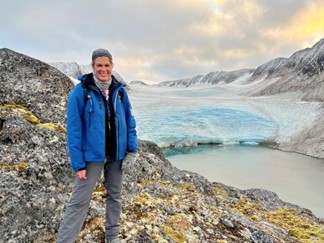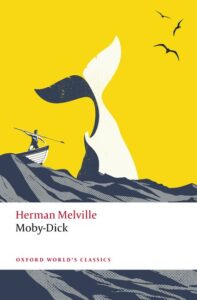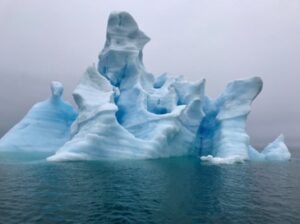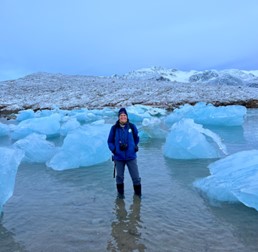The Climate of Literary Studies: An English Professor Reimagines the Discipline’s Reach

You never quite get used to it, setting foot on Arctic ground. Hester Blum has made multiple voyages to the polar regions over the past eight years but reports that her “increased exposure” to these remote and often dangerous environments “has not led to a feeling of any kind of authorization” to be there. Blum, a professor of English at Penn State, takes this sense of “estrangement” from her object of study in stride: “It’s been incredibly illuminating,” she says.
Though her training is in nineteenth-century American literature, Blum has devoted the past several years to the polar humanities, an emerging interdisciplinary field that takes as its subject the vast lands and diverse cultures of the Arctic region. It’s not such an intellectual leap, she contends, from her early-career work on sailors’ narratives to her most recent expedition to the Arctic Circle. She explains, “Everything I’d ever tried to write [argued] that maritime knowledge is its own thing.” After spending time at sea herself, Blum now appreciates how multifaceted that maritime knowledge can be, fraught as it is with “the tension between labor knowledge, epistemology, experiential knowledge, and sort of book learning.”

True to form, Blum analogizes her experience as an academic on unfamiliar (literal and figurative) ground to “one of Ishmael’s opening lines” in Moby-Dick. “He says that people who are passengers are not part of that ‘universal thump.’ You’re not in, you’re on the outside.”
Indeed, Blum is still working out her place not only in the Arctic, but also in the academy. One of her central questions is “what it means to be a polar humanist and not a polar scientist.” After all, research in the humanities—and in literary studies particularly—is not typically conducted aboard a whaleship or across the frozen tundra. As Blum notes, “In certain fields and disciplines…going to the place and site of your intellectual inquiry is an absolute given, but it’s actually not a given in literary study. Many of us will travel to libraries or archives or repositories of texts, or might benefit from a trip to a site or source of some of the stuff we work on, but it is just not an expectation: we don’t do field work in that sense.”
“Is there a version of humanities fieldwork?” Blum wonders. The answer, she suggests, is yes—but there are myriad factors, both practical and philosophical, to take into consideration. Irrespective of discipline, “fieldwork” is “not an unproblematic term,” says Blum. In the polar humanities, the ethics of representation are central: “I don’t want my role to be as a kind of explainer of the exoticism and remoteness and challenges of the North—that would be ethically abhorrent to me.”
Blum points to the work of Inuk writers like Sheila Watt-Cloutier, whose book The Right to Be Cold argues that some “may find the arctic cold and inhospitable, but [Arctic indigenous peoples] do not.” Watt-Cloutier’s book, among others, has prompted Blum to reconceptualize her relationship to the Arctic region and the polar humanities. Accordingly, her next book project will take what Blum calls an “auto-theoretical” approach to trace her ever-shifting understanding of the environmental and humanitarian implications of Arctic fieldwork. Ultimately, Blum says, “I’m trying to kind of find ways to be listening and learning from [Arctic indigenous peoples] and potentially in conversation about the inhabited North in a different way.”

That Blum frames her methodological evolution in terms of listening and conversing—rather than the more anthropological terms of observing or recording—is a testament, she believes, to her training in the humanities. “I’m still a literary scholar,” she says. “My methodologies are informed by that kind of work, even though the object of study is very different from recognizable literature in a lot of ways.”
Blum’s comments highlight an important fact of literary and cultural studies: the skills they inculcate are eminently flexible, agile, and portable. Through her work (alongside Penn State English doctoral candidate Miriam Gonzales) with the Grad Futures Initiative, Blum seeks to emphasize to graduate students and faculty that “this is a profession. It may be like a calling or an intellectual life, but it’s a job on every level.” She adds, “There’s nothing wrong with understanding what we do as academics as being a skill set.…Teaching a class is managing a team; when you’re a grad student, helping a professor organize a conference or symposium is a kind of project management that involves working with a budget and delegating responsibilities.”
This “translation of terms” is vital to the success of English PhDs pursuing jobs beyond the traditional—and increasingly impossible—tenure track. Blum is highly conscious of the structural problems and inequities in academic hiring, what is sometimes called the adjunctification of the profession. She readily admits that “the costs” of working in the polar humanities, financially and otherwise, “are prohibitive”: “It’s not work I could have done in a pre-tenure way or in an institutionally precarious way.”
To that end, Blum believes it is incumbent on tenured scholars in the humanities to remain attuned to (and prepared to advocate for) the needs of early-career scholars. She’s found Twitter, and particularly the corner of the site known as “Academic Twitter,” to be especially useful in keeping up with the successes and struggles of those who are new to the profession. By following these colleagues on Twitter, says Blum, “I have a sense of what early-career scholars—meaning both current grads, recent grads, those in temporary positions, those in post-docs, those in early tenure-line positions—are talking about and feeling about the state of the profession.”

For Blum, “the most important thing about Academic Twitter is what it communicates about the state of early-career scholars right now. And it’s not a happy state—it’s really not a happy state—and I think it’s really easy not to see that.”
Thankfully, Blum herself never shies away from examining those things that too often go unseen, confronting those realities that too often go ignored. From the historically undertheorized Arctic region to the worrisome state of academia, there is no terrain—geographic or professional—that Hester Blum is afraid to explore.

You never quite get used to it, setting foot on Arctic ground. Hester Blum has made multiple voyages to the polar regions over the past eight years but reports that her “increased exposure” to these remote and often dangerous environments “has not led to a feeling of any kind of authorization” to be there. Blum, a professor of English at Penn State, takes this sense of “estrangement” from her object of study in stride: “It’s been incredibly illuminating,” she says.
Though her training is in nineteenth-century American literature, Blum has devoted the past several years to the polar humanities, an emerging interdisciplinary field that takes as its subject the vast lands and diverse cultures of the Arctic region. It’s not such an intellectual leap, she contends, from her early-career work on sailors’ narratives to her most recent expedition to the Arctic Circle. She explains, “Everything I’d ever tried to write [argued] that maritime knowledge is its own thing.” After spending time at sea herself, Blum now appreciates how multifaceted that maritime knowledge can be, fraught as it is with “the tension between labor knowledge, epistemology, experiential knowledge, and sort of book learning.”

True to form, Blum analogizes her experience as an academic on unfamiliar (literal and figurative) ground to “one of Ishmael’s opening lines” in Moby-Dick. “He says that people who are passengers are not part of that ‘universal thump.’ You’re not in, you’re on the outside.”
Indeed, Blum is still working out her place not only in the Arctic, but also in the academy. One of her central questions is “what it means to be a polar humanist and not a polar scientist.” After all, research in the humanities—and in literary studies particularly—is not typically conducted aboard a whaleship or across the frozen tundra. As Blum notes, “In certain fields and disciplines…going to the place and site of your intellectual inquiry is an absolute given, but it’s actually not a given in literary study. Many of us will travel to libraries or archives or repositories of texts, or might benefit from a trip to a site or source of some of the stuff we work on, but it is just not an expectation: we don’t do field work in that sense.”
“Is there a version of humanities fieldwork?” Blum wonders. The answer, she suggests, is yes—but there are myriad factors, both practical and philosophical, to take into consideration. Irrespective of discipline, “fieldwork” is “not an unproblematic term,” says Blum. In the polar humanities, the ethics of representation are central: “I don’t want my role to be as a kind of explainer of the exoticism and remoteness and challenges of the North—that would be ethically abhorrent to me.”
Blum points to the work of Inuk writers like Sheila Watt-Cloutier, whose book The Right to Be Cold argues that some “may find the arctic cold and inhospitable, but [Arctic indigenous peoples] do not.” Watt-Cloutier’s book, among others, has prompted Blum to reconceptualize her relationship to the Arctic region and the polar humanities. Accordingly, her next book project will take what Blum calls an “auto-theoretical” approach to trace her ever-shifting understanding of the environmental and humanitarian implications of Arctic fieldwork. Ultimately, Blum says, “I’m trying to kind of find ways to be listening and learning from [Arctic indigenous peoples] and potentially in conversation about the inhabited North in a different way.”

That Blum frames her methodological evolution in terms of listening and conversing—rather than the more anthropological terms of observing or recording—is a testament, she believes, to her training in the humanities. “I’m still a literary scholar,” she says. “My methodologies are informed by that kind of work, even though the object of study is very different from recognizable literature in a lot of ways.”
Blum’s comments highlight an important fact of literary and cultural studies: the skills they inculcate are eminently flexible, agile, and portable. Through her work (alongside Penn State English doctoral candidate Miriam Gonzales) with the Grad Futures Initiative, Blum seeks to emphasize to graduate students and faculty that “this is a profession. It may be like a calling or an intellectual life, but it’s a job on every level.” She adds, “There’s nothing wrong with understanding what we do as academics as being a skill set.…Teaching a class is managing a team; when you’re a grad student, helping a professor organize a conference or symposium is a kind of project management that involves working with a budget and delegating responsibilities.”
This “translation of terms” is vital to the success of English PhDs pursuing jobs beyond the traditional—and increasingly impossible—tenure track. Blum is highly conscious of the structural problems and inequities in academic hiring, what is sometimes called the adjunctification of the profession. She readily admits that “the costs” of working in the polar humanities, financially and otherwise, “are prohibitive”: “It’s not work I could have done in a pre-tenure way or in an institutionally precarious way.”
To that end, Blum believes it is incumbent on tenured scholars in the humanities to remain attuned to (and prepared to advocate for) the needs of early-career scholars. She’s found Twitter, and particularly the corner of the site known as “Academic Twitter,” to be especially useful in keeping up with the successes and struggles of those who are new to the profession. By following these colleagues on Twitter, says Blum, “I have a sense of what early-career scholars—meaning both current grads, recent grads, those in temporary positions, those in post-docs, those in early tenure-line positions—are talking about and feeling about the state of the profession.”

For Blum, “the most important thing about Academic Twitter is what it communicates about the state of early-career scholars right now. And it’s not a happy state—it’s really not a happy state—and I think it’s really easy not to see that.”
Thankfully, Blum herself never shies away from examining those things that too often go unseen, confronting those realities that too often go ignored. From the historically undertheorized Arctic region to the worrisome state of academia, there is no terrain—geographic or professional—that Hester Blum is afraid to explore.